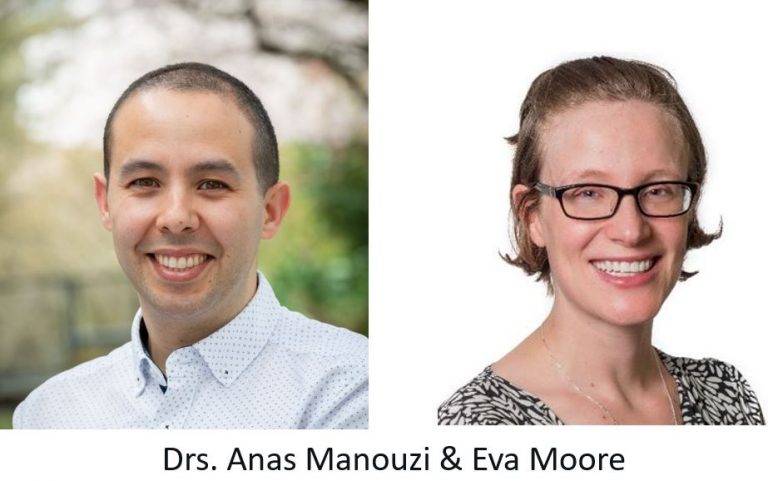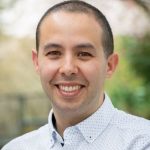
We will be featuring outstanding faculty all week to celebrate National Physicians’ Day.

Dr. Anas Manouzi
Dr. Anas Manouzi, Clinical Instructor and 2020-2022 Hudson Scholar in Equity Diversity and Inclusion nominated by Dr. Laura Sauvé, Clinical Assistant Professor, Department of Pediatrics, BC Children’s Hospital, UBC & BCCH
What is your role? Please indicate the centre or clinic you work at.
I work as a Pediatric Emergency Physician at BC Children’s Hospital. I serve as the clinical lead for Health Equity and Anti-Racism within the ED. This work is supported through the Hudson Scholar program. I am also helping coordinate the response to the opioid-related overdose public health emergency.
What do you enjoy most about your role?
I enjoy teaching trainees under my supervision about concrete ways to advance Health Equity in their clinical practice. Simple things like adopting non-stigmatizing language, moving away from race-based medicine when making clinical decisions, or enquiring about financial barriers to afford essential medications allow us to become better advocates. Ever since I started my Health Equity and Anti-racism leadership role, I have been amazed by the support and engagement of my colleagues in the ED. I feel very lucky to work with a fantastic group of health professionals, non-clinical staff, and educators who understand the importance of this work and the impacts it has on patient care.
What prompted you to get into your area of health care?
The Emergency Department plays a unique social justice role in our society. The ED stays open 24/7, there are no waitlists or admission criteria. Anyone who comes to the ED will eventually get attended to, regardless of the perceived severity of their presentation. Unfortunately, our medical system fails to provide equitable care to those made most vulnerable by systemic discrimination. Being able to provide medical care to those who “fall through the cracks” and to advocate on their behalf is a determining factor in my decision to be a Pediatric Emergency Physician.
What would you say to someone interested in joining this line of work?
Racism and other intersecting forms of oppression are unfortunately pervasive within our institutions. Trying to change these rigid systems cannot happen by working alone. My advice: surround yourself with people who are not afraid to reflect on their own biases and to change their practices. In order to achieve social justice in health care, we must build coalitions.
What is your proudest accomplishment to date?
Delivering my first Grand Rounds talk at the UBC Department of Pediatrics as a Hudson Scholar in Equity, Diversity, and Inclusion was a very memorable moment for me. After completing my residency and fellowship trainings at BC Children’s Hospital, I felt very honored to have the opportunity to teach my mentors and colleagues about the dangers of race-based medicine and why Anti-Racism must be recognized as a required professional competency.

Dr. Eva Moore
Dr. Eva Moore, Clinical Associate Professor nominated by Sabrina Gill, BSN, Nurse Clinician Adolescent Medicine and Health, UBC & BC Children’s Hospital
What is your role?
Clinical Associate Professor, Division of Adolescent Health and Medicine
Investigator, BC Children’s Hospital Research Foundation
Program Director, Subspecialty Residency in Adolescent Medicine, University of British Columbia
McCreary Centre Society, Board member
Juvenile Justice Special Interest Group, Society for Adolescent Health and Medicine, member & group facilitator
Please indicate the centre or clinic you work at:
Eva is an Adolescent Medicine Specialist in the Division of Adolescent Health and Medicine Division. Eva currently works at these clinics:
Adolescent Health Clinic: I strive for a youth friendly practice, focusing on positive youth development and resilience, and health equity for adolescent who experience marginalization. As a specialized multidisciplinary pediatric team serves adolescents who experience chronic illness and psychosocial challenges such as mental health and substance use disorders.
Provincial Eating Disorders Program: I provide inpatient and outpatient consultation of children and adolescents in the mental health provincial program (tier 4) and assessment of new patients referred to the program with suspected eating disorders.
RICHER Program (Responsive Intersectoral Child Health Education Research, a social pediatrics program in inner-city Vancouver): As part of an interdisciplinary team with community consultation, serves the health of Vancouver youth adversely affected by social determinants of health. I built several regular clinics and provided consultation at weekly community meetings with allied health providers. I am on numerous community tables and initiatives to address health issues from a multi-leveled, intersectoral approach.
Pinnacle Program Alternative School: I serve as the onsite adolescent medicine consultant for 20 senior secondary school students involved with the foster care system and/or youth probations with severe behavioral and mental health school designations
What do you enjoy most about your role?
What I love most is hearing people’s stories and standing side by side with them on some of the most significant parts of their journey. I love seeing people find their path and to help them have the health that they need to enjoy what is most important to them. I love working with youth which is a time in their lives where they are changing rapidly and growing. I enjoy seeing them come into themselves.
My job allows me to have multiple roles, as an educator, a clinician, and a researcher. I enjoy working with other that are passionate about youth and seeing them coming into themselves. Teamwork is important with me, and I love working with people from different backgrounds, professions, and who carry their own experiential journey which may be different from mine.
I am drawn to working with youth and families who are marginalized by our social structures. This is my commitment to social justice. I want to improve health equity and decrease health disparities for our most vulnerable populations. I aim to give all people a voice.
What prompted you to get into your area of health care?
I went into medicine because I loved science, critical thinking, and bringing an evidence base to my work. I was a chemistry major, but I found basic science to be too far removed from the impact of what we were working on. I wanted to use my critical thinking skills for something that improved humanity. My first job in health, as I was applying to medical school, happened to be working with youth in the inner city of Philadelphia. I came to love these young people and their sense of curiosity and energy as we explored the city together, taking on challenges of how to improve health care for teenagers. More then anything, I learned from them, and this was a foundational experience. During medical school, I was part of many health care teams, but I was most empowered by young people and seek to find a sense of belonging and to help them make the changes they want to see.
What would you say to someone interested in joining this line of work?
I would tell someone who wants to go into this field to follow their passions and to love the journey. Take the time that you need to explore what is important to you and what has meaning to you. It’s not about the destination, but instead the things you do along the way.
What is your proudest accomplishment to date?
I have many things to be proud and grateful for. One of things I hold in high regard is my relationships with my colleagues, and the teams that I get to be a part of. My colleagues describe as someone who is very mindful, compassionate and humble. These connections with these colleagues, working together towards common goals are so valuable.
I’m proud that my role reaches beyond the walls of my institution and reaches young people in their schools and communities. I have built partnerships and meaningful connections by engaging community leaders, indigenous partner, youth workers, government agencies and youth. It means so much to me when a youth worker or teacher calls me directly about a young person who needs help. For some of our youth, this is the only way they can establish trust in healthcare.
I have been involved in leadership and collaboration to create an urgent paradigm shift in how we care for adolescents with substance youth. This includes multiple committees, presentations and research partnerships to bring an interdisciplinary and multi-layered approach to improving care for adolescents affected by substance use overdoses, now one of the leading causes of death for adolescents.
Specifically, this effort is to focus on increasing capacity of pediatricians and pediatric hospitals to care for youth with serious substance use, both in BC and across Canada. I have arranged my patient to be the first year in Canada to receive a life saving medication, Sublocade. This paved the way for more to follow and is an example of my advocacy and partner relationship and working towards best practice and evidenced based medicine for youth who are at risk of death due to opioid overdose.